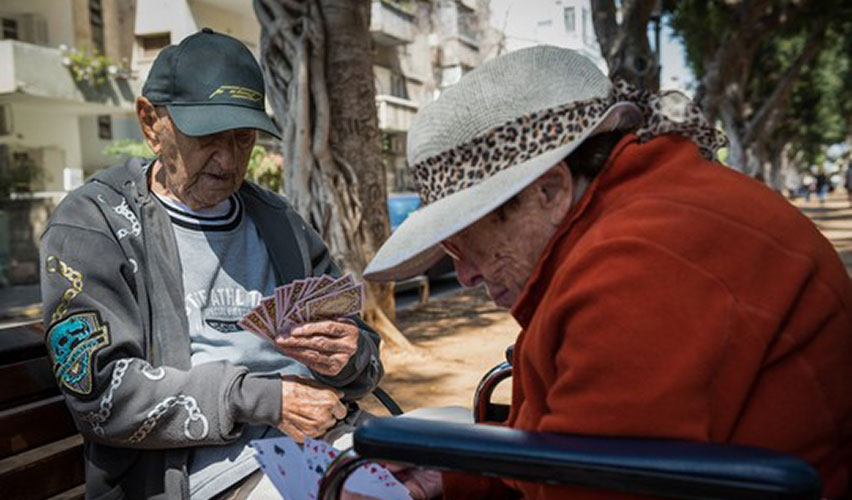One in three elderly Israeli is forced to choose between food, medicine or heating in winter. More than half have no pension, and the existing state benefits amount to a ridiculous sum that doesn’t guarantee subsistence, let alone a dignified life. A new initiative demands that the state commits to a minimum income that will lift elderly citizens out of poverty.
Let’s start at the end: we cannot accept a reality where more than half of elderly Israelis live in poverty. And refusing this reality means fighting for change.
The struggle of We Stand Together (Omdim Beyahad) alongside Koach LaOvdim (a democratic trade union) is based on the premise that everyone has the right to a dignified life. We have the right to live a dignified life during our working and retirement years. While the minimum wage guarantees the minimal ability for existence during our working years, the state does not guarantee its citizens’ ability to live a dignified life after they retire.
And retirement is exactly the age expenses increase (such as health expenses) and people who worked their whole life expect a sharp decrease in their earnings. Why? Because the state’s retirement benefits amount to 1531 NIS ($404), and with extra funding to a ridiculous 3000 NIS ($792) per month. But what about pensions? Well more than half of retirees have no pension arrangements. And a large percentage of us still working have miserable pensions and arrangements that won’t really guarantee anything beyond a few hundred NIS per month after retirement.
Now let me return to the everyday reality of the elderly Israelis. State statistics show that one in four elderly citizens lives well below the poverty line, and one in three has to choose between food, medication and heating in winter. These aren’t the deplorable cases of elderly people who live on the margins of society, but our grandfathers and grandmothers and parents. This sad reality cuts across Israeli society: Jews and Arabs, Mizrahi and Ashkenazi, Holocaust survivors, and residents in the center as well as the periphery. I think of my grandmother, a 78-year-old woman, who was born in this country, and couldn’t survive without her children’s and grandchildren’s help. And there are many like her. But not everyone has this assistance. I think of my parents, my daughter, and myself.
We have an opportunity to change this reality and promise a (bit) better future for all of us
This is why over the past months, we, at We Stand Together initiated our struggle for the minimum of 5000 NIS ($1320). [The goal], first and foremost, is living and aging in a dignified way in this country. But beyond that, we believe in the ability of a common social struggle to bring people together—from different places and different communities—and fight for this common cause. As it gains support, this struggle will be a struggle of everyone who lives here. That is why it was clear to us when we founded this movement that it’s a bilingual struggle: we speak both Hebrew and Arabic.
There are sources of funding
Our demand is simple: the state would guarantee a monthly income of at least 5000 NIS for each retired citizen.
We demand a differential mechanism to ensure that after calculating all an elderly citizen’s income, the state would contribute funds to reach the sum of 5000 NIS.
The plan we propose will benefit many populations in Israel’s working sector. First, it would help those who retired before 2008, when the Obligatory Pension Law went in force. Second, the plan will help immigrants who do not have pensions in their countries of origin.
Among these populations we can find Ethiopian and former Soviet immigrants, who immigrated near retirement age, but have to work well throughout their 70s and 80s. In addition, this plan will profoundly help Israeli Arabs who’ve for years suffered discrimination in funding and forced unemployment, and therefore lack pensions.
In the three days since we launched our campaign many people said our demands are important but there is no money. Well, thank you for asking. We have a very clear answer.
We simply suggest to take from the wealthiest among us to fund our demands: to charge the full tax on international multinational corporations and tycoons instead of decreasing it. And finally, we suggest to put in place in Israel, like in many western countries, a tax on any inheritance over 7 million NIS ($1.8 million).
This struggle for minimum 5000 NIS is gaining force and we intend to go as far as we can: to concentrate maximum power in as many populations possible and then bring this power to a conclusion in the Knesset and government. This is not only a struggle for the amount of money elderly Israelis receive. This is a struggle for a dignified life in Israel.
Ziv Berkovitz Fadida campaigns in We stand together and is a leader of Koach Lavodim, a Trade Union.
The original was published in Local Call
Translation: Dana Mills






Leave A Comment